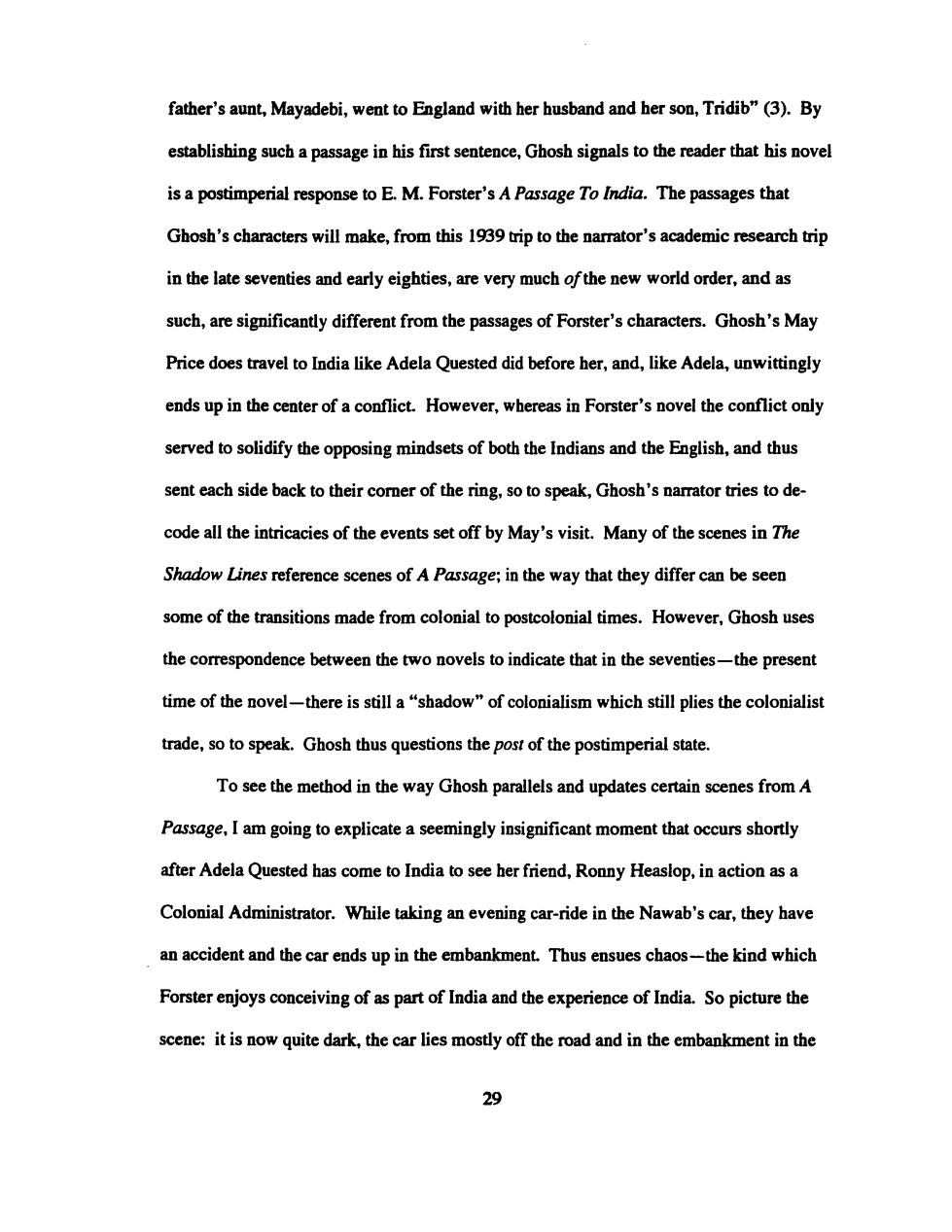
father's aunt,Mayadebi,went to England with her husband and her son,Tridib"(3).By establishing such a passage in his first sentence,Ghosh signals to the reader that his novel is a postimperial response to E.M.Forster's A Passage To India.The passages that Ghosh's characters will make,from this 1939 trip to the narrator's academic research trip in the late seventies and early eighties,are very much ofthe new world order,and as such,are significantly different from the passages of Forster's characters.Ghosh's May Price does travel to India like Adela Quested did before her,and,like Adela,unwittingly ends up in the center of a conflict.However,whereas in Forster's novel the conflict only served to solidify the opposing mindsets of both the Indians and the English,and thus sent each side back to their corner of the ring,so to speak,Ghosh's narrator tries to de- code all the intricacies of the events set off by May's visit.Many of the scenes in The Shadow Lines reference scenes of A Passage;in the way that they differ can be seen some of the transitions made from colonial to postcolonial times.However,Ghosh uses the correspondence between the two novels to indicate that in the seventies-the present time of the novel-there is still a "shadow"of colonialism which still plies the colonialist trade,so to speak.Ghosh thus questions the post of the postimperial state To see the method in the way Ghosh parallels and updates certain scenes from A Passage,I am going to explicate a seemingly insignificant moment that occurs shortly after Adela Quested has come to India to see her friend,Ronny Heaslop,in action as a Colonial Administrator.While taking an evening car-ride in the Nawab's car,they have an accident and the car ends up in the embankment.Thus ensues chaos-the kind which Forster enjoys conceiving of as part of India and the experience of India.So picture the scene:it is now quite dark,the car lies mostly off the road and in the embankment in the 29
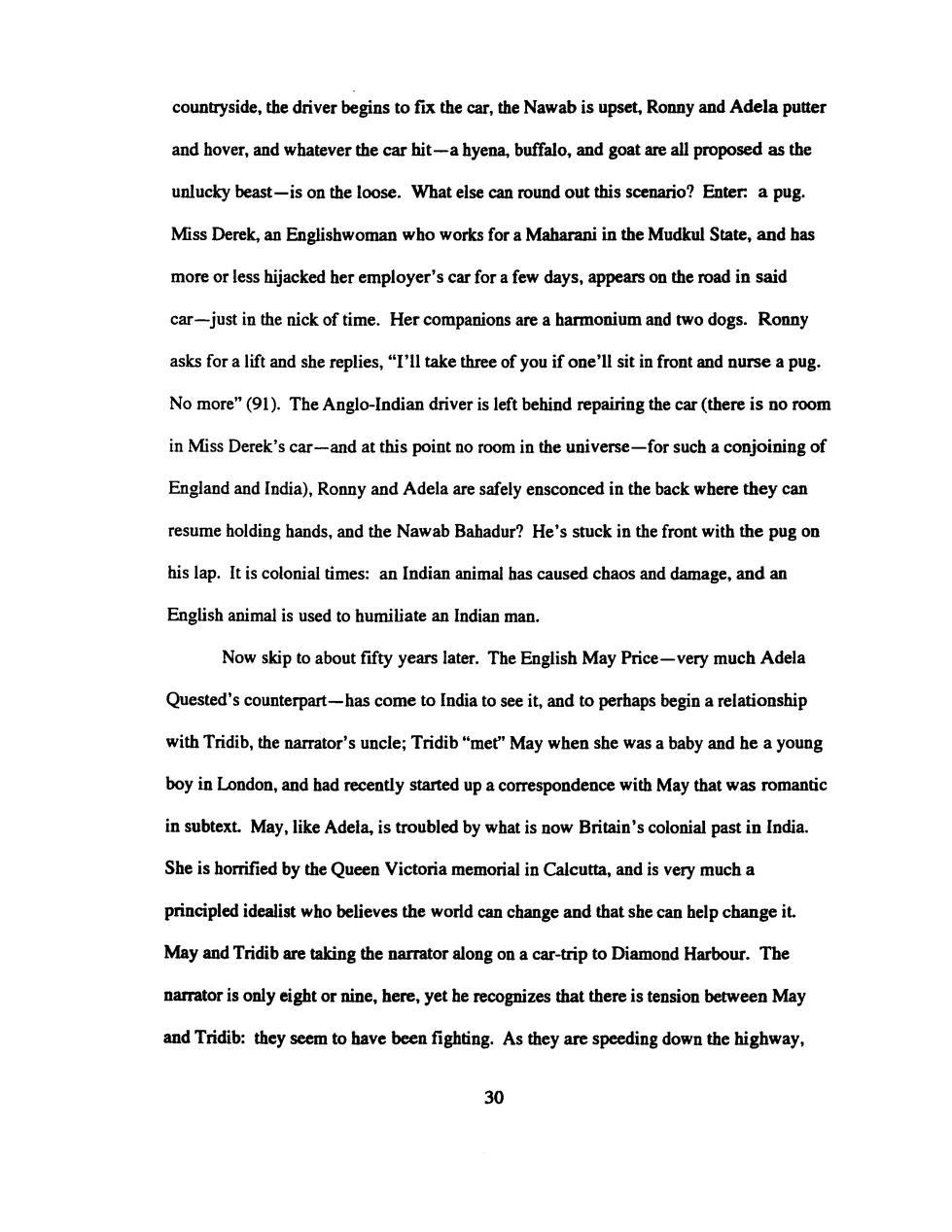
countryside,the driver begins to fix the car,the Nawab is upset,Ronny and Adela putter and hover,and whatever the car hit-a hyena,buffalo,and goat are all proposed as the unlucky beast-is on the loose.What else can round out this scenario?Enter:a pug. Miss Derek,an Englishwoman who works for a Maharani in the Mudkul State,and has more or less hijacked her employer's car for a few days,appears on the road in said car-just in the nick of time.Her companions are a harmonium and two dogs.Ronny asks for a lift and she replies,"I'll take three of you if one'll sit in front and nurse a pug. No more"(91).The Anglo-Indian driver is left behind repairing the car (there is no room in Miss Derek's car-and at this point no room in the universe-for such a conjoining of England and India),Ronny and Adela are safely ensconced in the back where they can resume holding hands,and the Nawab Bahadur?He's stuck in the front with the pug on his lap.It is colonial times:an Indian animal has caused chaos and damage,and an English animal is used to humiliate an Indian man. Now skip to about fifty years later.The English May Price-very much Adela Quested's counterpart-has come to India to see it,and to perhaps begin a relationship with Tridib,the narrator's uncle;Tridib"met"May when she was a baby and he a young boy in London,and had recently started up a correspondence with May that was romantic in subtext.May,like Adela,is troubled by what is now Britain's colonial past in India. She is horrified by the Queen Victoria memorial in Calcutta,and is very much a principled idealist who believes the world can change and that she can help change it. May and Tridib are taking the narrator along on a car-trip to Diamond Harbour.The narrator is only eight or nine,here,yet he recognizes that there is tension between May and Tridib:they seem to have been fighting.As they are speeding down the highway, 30
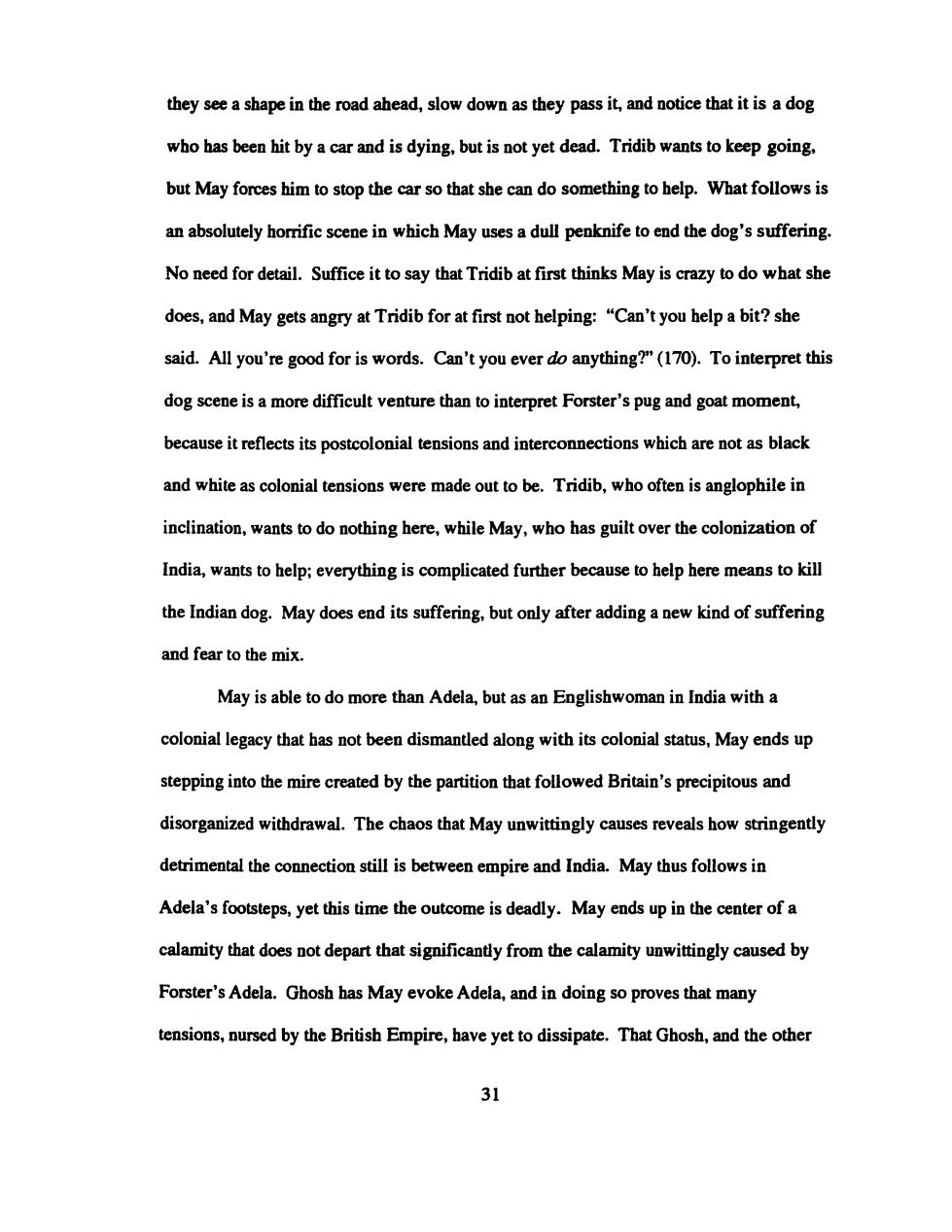
they see a shape in the road ahead,slow down as they pass it,and notice that it is a dog who has been hit by a car and is dying,but is not yet dead.Tridib wants to keep going, but May forces him to stop the car so that she can do something to help.What follows is an absolutely horrific scene in which May uses a dull penknife to end the dog's suffering No need for detail.Suffice it to say that Tridib at first thinks May is crazy to do what she does,and May gets angry at Tridib for at first not helping:"Can't you help a bit?she said.All you're good for is words.Can't you ever do anything?"(170).To interpret this dog scene is a more difficult venture than to interpret Forster's pug and goat moment, because it reflects its postcolonial tensions and interconnections which are not as black and white as colonial tensions were made out to be.Tridib,who often is anglophile in inclination,wants to do nothing here,while May,who has guilt over the colonization of India,wants to help;everything is complicated further because to help here means to kill the Indian dog.May does end its suffering,but only after adding a new kind of suffering and fear to the mix. May is able to do more than Adela,but as an Englishwoman in India with a colonial legacy that has not been dismantled along with its colonial status,May ends up stepping into the mire created by the partition that followed Britain's precipitous and disorganized withdrawal.The chaos that May unwittingly causes reveals how stringently detrimental the connection still is between empire and India.May thus follows in Adela's footsteps,yet this time the outcome is deadly.May ends up in the center of a calamity that does not depart that significantly from the calamity unwittingly caused by Forster's Adela.Ghosh has May evoke Adela,and in doing so proves that many tensions,nursed by the British Empire,have yet to dissipate.That Ghosh,and the other 31
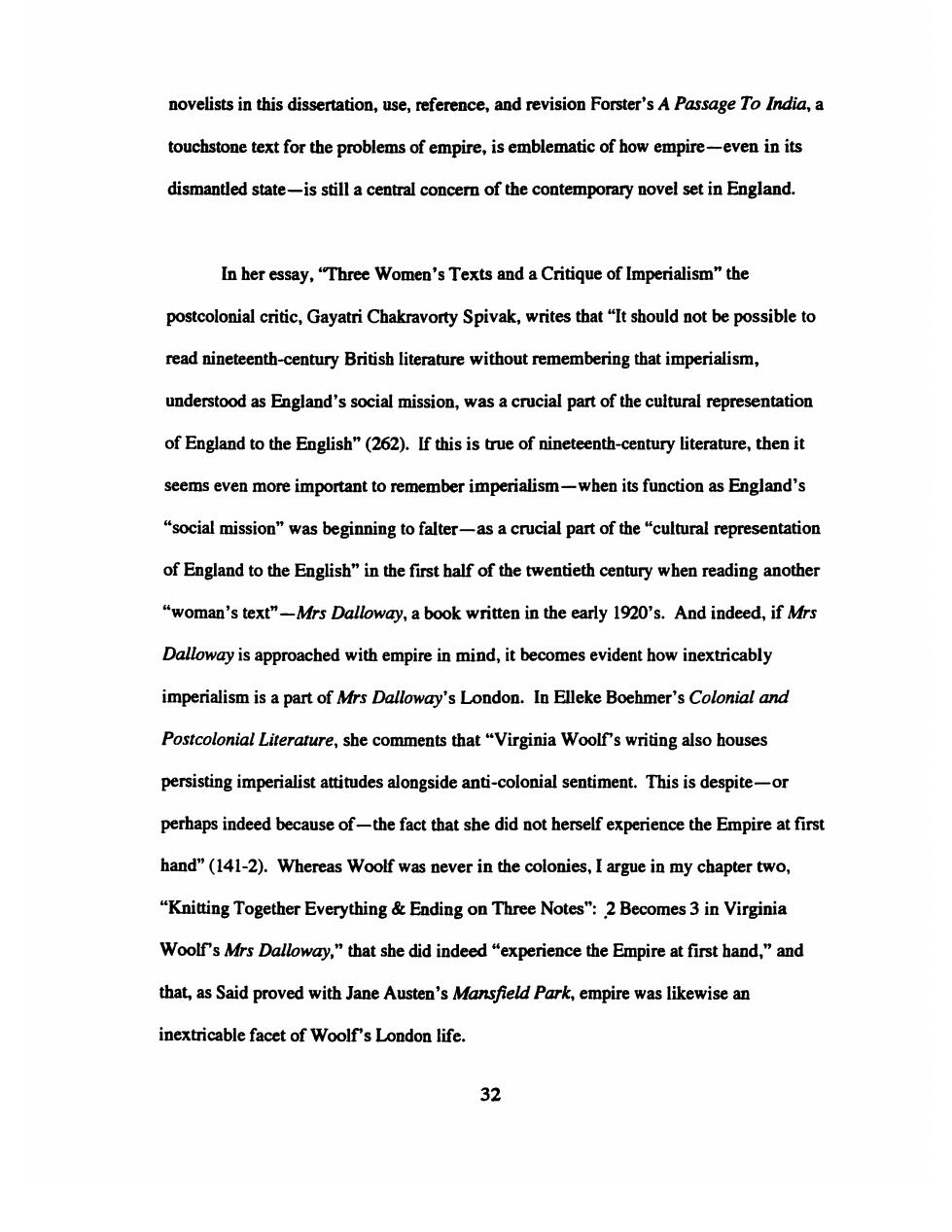
novelists in this dissertation,use,reference,and revision Forster's A Passage To India,a touchstone text for the problems of empire,is emblematic of how empire-even in its dismantled state-is still a central concern of the contemporary novel set in England. In her essay,"Three Women's Texts and a Critique of Imperialism"the postcolonial critic,Gayatri Chakravorty Spivak,writes that"It should not be possible to read nineteenth-century British literature without remembering that imperialism, understood as England's social mission,was a crucial part of the cultural representation of England to the English"(262).If this is true of nineteenth-century literature,then it seems even more important to remember imperialism-when its function as England's "social mission"was beginning to falter-as a crucial part of the "cultural representation of England to the English"in the first half of the twentieth century when reading another "woman's text"-Mrs Dalloway,a book written in the early 1920's.And indeed,if Mrs Dalloway is approached with empire in mind,it becomes evident how inextricably imperialism is a part of Mrs Dalloway's London.In Elleke Boehmer's Colonial and Postcolonial Literature,she comments that"Virginia Woolf's writing also houses persisting imperialist attitudes alongside anti-colonial sentiment.This is despite-or perhaps indeed because of-the fact that she did not herself experience the Empire at first hand"(141-2).Whereas Woolf was never in the colonies,I argue in my chapter two, "Knitting Together Everything Ending on Three Notes":2 Becomes 3 in Virginia Woolf's Mrs Dalloway,"that she did indeed "experience the Empire at first hand,"and that,as Said proved with Jane Austen's Mansfield Park,empire was likewise an inextricable facet of Woolf's London life. 32
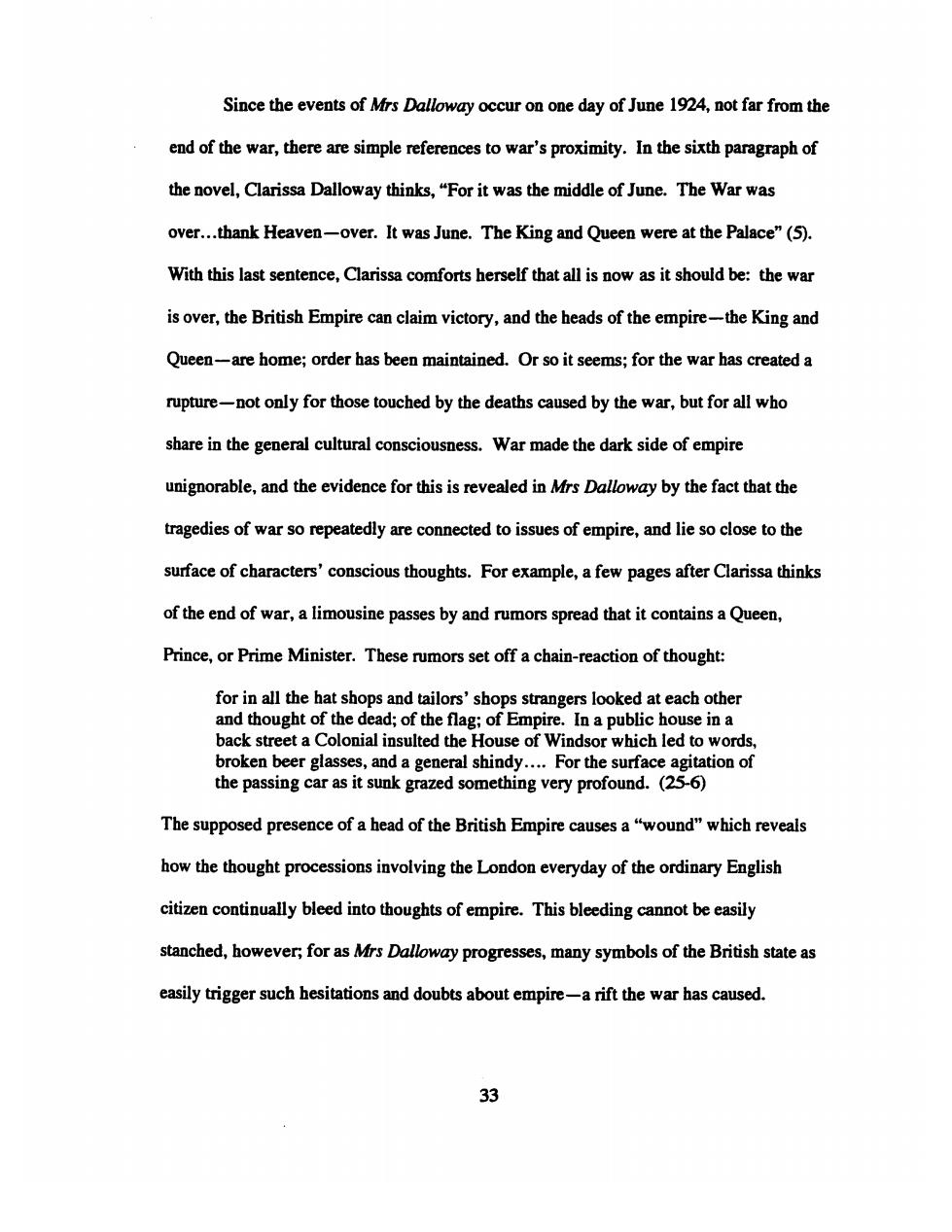
Since the events of Mrs Dalloway occur on one day of June 1924,not far from the end of the war,there are simple references to war's proximity.In the sixth paragraph of the novel,Clarissa Dalloway thinks,"For it was the middle of June.The War was over...thank Heaven-over.It was June.The King and Queen were at the Palace"(5). With this last sentence,Clarissa comforts herself that all is now as it should be:the war is over,the British Empire can claim victory,and the heads of the empire-the King and Queen-are home;order has been maintained.Or so it seems;for the war has created a rupture-not only for those touched by the deaths caused by the war,but for all who share in the general cultural consciousness.War made the dark side of empire unignorable,and the evidence for this is revealed in Mrs Dalloway by the fact that the tragedies of war so repeatedly are connected to issues of empire,and lie so close to the surface of characters'conscious thoughts.For example,a few pages after Clarissa thinks of the end of war,a limousine passes by and rumors spread that it contains a Queen, Prince,or Prime Minister.These rumors set off a chain-reaction of thought: for in all the hat shops and tailors'shops strangers looked at each other and thought of the dead;of the flag;of Empire.In a public house in a back street a Colonial insulted the House of Windsor which led to words, broken beer glasses,and a general shindy....For the surface agitation of the passing car as it sunk grazed something very profound.(25-6) The supposed presence of a head of the British Empire causes a "wound"which reveals how the thought processions involving the London everyday of the ordinary English citizen continually bleed into thoughts of empire.This bleeding cannot be easily stanched,however;for as Mrs Dalloway progresses,many symbols of the British state as easily trigger such hesitations and doubts about empire-a rift the war has caused. 33